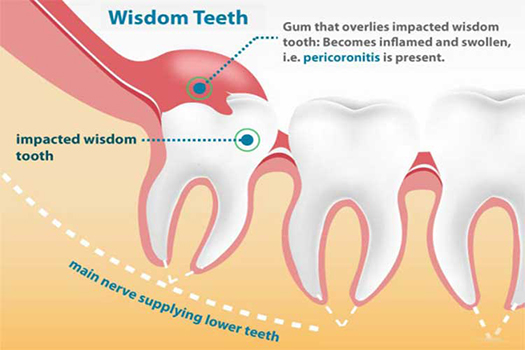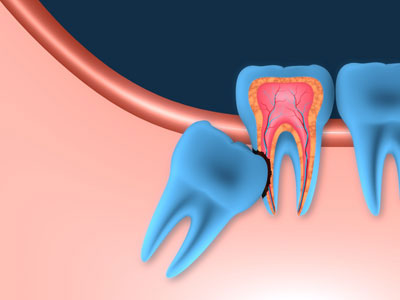Wisdom Teeth Removal

Third molars, commonly known as your wisdom teeth, are typically the last teeth to erupt in your mouth. If healthy and functional, your wisdom teeth can be helpful. However, there are also reasons why you may need to consider removing your wisdom teeth. St. Lawrence Dentistry removes wisdom teeth awake or asleep. Dr. Hawryluk Jr. completed a general practice residency focusing on Wisdom teeth removal at the University of Colorado and has performed thousands of wisdom teeth removals.

Wisdom teeth can be partially impacted, which means the entire crown of the wisdom tooth cannot fully penetrate through the gum. This configuration can cause swelling, pain, and even infection of the surrounding gum. They can also put pressure on the adjacent teeth, resulting in permanent damage to these otherwise healthy teeth and their surrounding bone. Often such a configuration can lead to deep root decay of a second molar necessitating extensive treatment for the second molar if the wisdom tooth removal is not prompt. Sometimes, impacted or partially impacted wisdom teeth can lead to the formation of cysts, and in rare scenarios, even tumors, which can have drastic effects on your jawbone. Lastly, a fully erupted wisdom tooth sometimes needs to be removed because they are tough to clean and can become severely decayed. So, for these reasons, sometimes it is prudent to consider wisdom teeth removal.

The first step of treatment is to take a radiograph and see the status of your wisdom teeth. In some cases, Dr. Hawryluk may order a CT image that will give more information than a regular x-ray. In particular, the CT scan can tell precisely where the surrounding nerves are and provide insight into safely removing your tooth. A discussion between you and your Dr. Hawryluk about which teeth need removal and the rationale behind the recommendations will ensue. We may give you the option of doing the treatment awake, asleep, or with partial sedation.

If you elect to do the treatment awake, you can expect to feel some controlled pressure, but there should be no pain. The time it takes to remove is dependent on the tooth and the patient. Please keep in mind the procedure’s end goal is to ensure the best recovery, and sometimes this means taking a slower systematic approach to the removal. Very mild sedation by Ativan tablets is an option if you are awake for a wisdom tooth removal. Suppose you would like Ativan for the procedure. We will dispense the Ativan to you when you arrive at our office. Since they are sublingual tablets, they take effect quickly. Please note you cannot drive after taking Ativan and should arrange for a ride home.

Removing teeth asleep is a very popular option at St. Lawrence Dentistry, and the Royal College of Dental has licensed us to provide dental work asleep since 2006. Board Certified Medical Anesthesiologists provide the anesthetic services, who work with Dr. Hawryluk to provide a safe, relaxing environment for your wisdom teeth removal.
To learn more about dental work asleep please visit us here:
Preparing for Dentistry Asleep
Another possibility is removing wisdom teeth with Nitrous Oxide gas. This gas gives a floating feeling and can help patients relax. Again, Dr. Hawryluk will discuss this option with you to see if it is right for you.
To learn more about nitrous oxide please visit us here:
Nitrous Oxide Dental Sedation Advantages
Sometimes there is an absolute need to removal a wisdom tooth, such as in a case of infection. In other cases, there can be a “relative need”. These are cases where there is no immediate need but leaving the wisdom tooth could pose problems that could be more difficult to deal with later. Dr. Hawryluk will go over all the pros and cons of removing wisdom teeth as it pertains to your situation so you can make an informed decision.
To learn more about wisdom teeth removal please visit us here:
Wisdom Teeth – Do They Need to Be Removed?
To learn more about after care following wisdom teeth (or any tooth extraction) please visit us here:
After Care Following Dental Extractions
We hope you have found this article informative. Thank you for reading!



